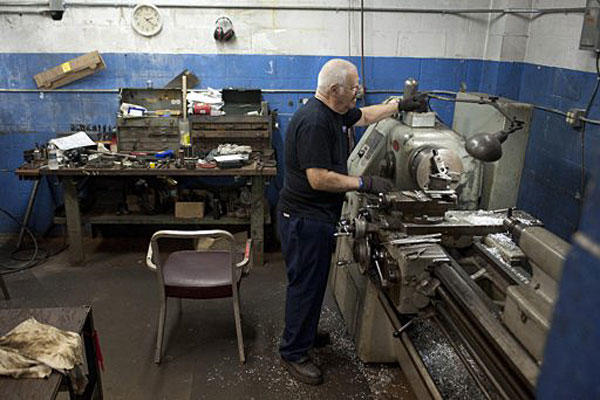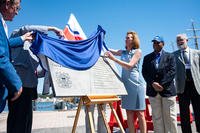Business owners competing for the withering number of U.S. military contracts face a surprising competitor -- American prisoners.
Business owners are crying foul over the number of clothing contracts -- including those for military uniforms -- awarded to Federal Prison Industries, also known as UNICOR.
UNICOR has earned a bevy of Army clothing contracts recently. It manufactures the Army’s Improved Physical Fitness Uniform, and from 2007 to 2011 the company produced about 40 percent of the Army Combat Uniform.
Offering these contracts to a company that employs U.S. inmates at federal prisons across the country for an average wage of 23 cents per hour has often had a negative effect on American small business owners.
Cathy Griffiths, the operations manager for clothing maker American Power Source of Fayette, Ala., said she had to lay off 50 of her 300 employees after UNICOR won the Army’s Improved Physical Fitness Uniform contract.
Of the more than $1 billion a year in federal contracts awarded to UNICOR, about 45 percent are Defense Department contracts. A Pentagon spokeswoman said last year’s total contract awards to UNICOR came to $193 million.
The Defense Department has awarded more than $2 billion in contracts to UNICOR over the past dozen years, according to the USASpending.gov, a website overseen by the Office of Management and Budget.
And it’s not just uniforms. UNICOR also manufactures radios, headsets, and Kevlar helmets -- 44,000 of which the Army recalled because of manufacturing flaws two years ago. U.S. prisoners also produce furniture, for which the Department of Veterans Affairs is a major customer, along with other federal departments and agencies across the government.
"The way the law is -- Federal Prison Industries gets first dibs and contracts up to a certain percentage before they have to compete against us," said Retired Air Force Col. Kurt Wilson, executive vice president of business development and government affairs for American Apparel. "The Army combat uniform, for instance, is an item that they take off the top. As a result, American taxpayers pay more for it -- but the bottom line is each soldier is paying more for their uniform."
Before joining American Apparel, Wilson oversaw uniform and textile contracting for the Defense Logistics Agency. He said American Apparel would charge $29.44 per uniform, but the UNICOR uniform costs $34.18 -- a 15 percent difference.
“Why would the price be higher, considering prisoners are paid so little?” he asked.
The Justice Department, which oversees UNICOR, declined to comment for this story. Spokeswoman Julie Rozier said in an email that contracts are not always awarded based on the lowest price but also on the best value for the government in terms of quantity and delivery processes.
UNICOR “typically falls in the middle” when it comes to costs, she said.
On its website, UNICOR touts the advantages of its operation, which includes 1,175 civil service employees and 13,000 inmates. UNICOR claims to buy half of its procurement needs from small, minority-owned or disadvantaged business, and a nationwide network of facilities.
UNICOR also points out that it does not rely on taxpayer money. All employee salaries and benefits, factory equipment and inmate compensation comes from revenue generated by UNICOR businesses.
The company also rejects the notion that it cuts into the profits of private business and industry. It’s not a business, but a correctional program selling products to the federal government and primarily focused on labor-intensive work providing skills and work experience to inmates, a UNICOR statement reads.
Inmates who work in prison industries or complete any of its vocational or apprenticeship programs are 24 percent less likely to go back to crime and 14 percent more likely to become gainfully employed, according to statistics provided by UNICOR.
“At some point, virtually all … inmates will return to our communities and need to find gainful employment,” according to a UNICOR statement on its website. “[UNICOR] can help them make this transition and become taxpayers rather than tax users.”
However, Griffiths, the operating manager at American Power Source, said UNICOR is hurting private business. Having to let go of 16 percent of her workforce after losing out on the Army’s Improved Physical Fitness Uniform contract hurt, she said.
What is happening is actually an injustice to both American Power Source employees and to the inmates, Griffiths said. She questions if exposing mostly male prisoners to the garment industry will help them find a job when they get out of prison. Thirty of 31 UNICOR clothing facilities are in male prisons.
“In the garment industry, this has always been a working mother’s job -- we work 7 to 3 and the wages, though not always the best, they’re good, decent wages,” Griffiths said.
American Power Source starts people at $9.25 an hour. That may not be much in some places, but it works for women who need a job where they can still be home when school lets out, she said.
“This has always been a good job for mothers. Of the company’s 261 employees, fewer than 10 are men. Sewing is not something men do for a living in the United States," she said.
Wilson believes the business of UNICOR is really just business. Not only does it make or refurbish products or provide services to government directly, UNICOR also now can contract out prison labor to private companies to include operating call centers.
“All the benefits of domestic outsourcing at offshore prices. It's the best kept secret in outsourcing!” UNICOR boasts on its website.
UNICOR is able to contract its prison labor to private companies that have a government contract to make military uniforms.
Wilson said this is what happened with a Marine Corps combat uniform contract awarded by the Defense Logistics Agency in June. Though his company was awarded a $14.7 million contract for the uniforms, a separate, $15.5 million contract for the same uniforms was given to Woolrich Inc. of Pennsylvania.
According to Wilson, most of the work will be done at federal prisons because Woolrich does not have the capacity to do the work.
“This is UNICOR [FPI] subbing to Woolrich,” he said. “Companies with no production capabilities are bidding on contacts, and having handshake deals with [UNICOR] to manufacture uniforms.”
Woolrich account director Michael Collin said the company would not comment on the specifics of its government contracts.
“That said, Woolrich does rely on a number of partners including FPI to complete its contacts, and it is these contracts that help keep the company's cutting facility and woolen mill, the nation’s oldest continually operating woolen mill, in operation,” he said.
The DLA contract announcement indicates the uniform work will be done in Pennsylvania, Mississippi, Texas, Alabama, and North Carolina. Collin said Woolrich operates a cutting facility in Jersey Shore, Pa. He would not say whether the other locations listed in the contract are private companies or prison facilities.
Wilson knew before he retired and joined American Apparel what was going on because he was the one putting out contracts to UNICOR, he said. He urged Congress to take a closer look at the effect UNICOR is having on the industrial base.
“What really needs to happen is congressional or Senate hearings, to review what [UNICOR’s] mission is, to get an understanding of the impact UNICOR is having on the industrial base and tying it back to an understanding of the readiness impact to the nation’s military,” Wilson said.



























